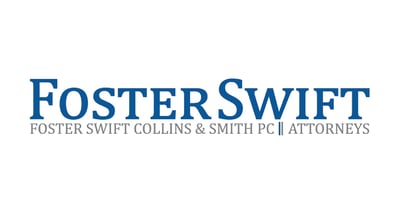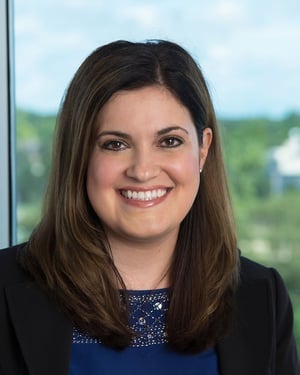
Employees Injured in Accidents while Occupying an Employer-Owned Vehicle
Jeffrey Mosher spoke with Stefania Gismondi Shareholder and a member of the General Litigation Practice Group in the Southfield office of Foster Swift Collins and Smith PC Attorneys.
She recently wrote an article for Foster Swift's Ag Law newsletter focusing on common questions and answers of what the new Michigan no-fault laws mean for employees that are injured in accidents while occupying employer-owned vehicles.
Hear Stefania and Jeffrey discuss the impacts of insurance reform, click on the PodCast shared below:
On May 30, 2019, Governor Gretchen Whitmer signed a bill that dramatically reformed the No Fault Act. The legislation made sweeping changes to laws that had existed for decades. Many of these changes will apply to automobile insurance policies renewed or issued after July 1, 2020.
Under the present law, no-fault policyholders purchase coverage that provides unlimited personal protection insurance benefits (“PIP” benefits) for allowable expenses (i.e. medical expenses, medical mileage, attendant care, or nursing/personal care, etc.).
Gismondi discusses several scenarios of vehicles and drivers under the new law.
Shared here is the new article from Foster Swift's Ag Law Newsletter:
 On May 30, 2019, Governor Gretchen Whitmer signed a bill that dramatically reformed the No Fault Act. The legislation made sweeping changes to laws that had existed for decades. Many of these changes will apply to automobile insurance policies renewed or issued after July 1, 2020.
On May 30, 2019, Governor Gretchen Whitmer signed a bill that dramatically reformed the No Fault Act. The legislation made sweeping changes to laws that had existed for decades. Many of these changes will apply to automobile insurance policies renewed or issued after July 1, 2020.
Under the present law, no-fault policyholders purchase coverage that provides unlimited personal protection insurance benefits (“PIP” benefits) for allowable expenses (i.e. medical expenses, medical mileage, attendant care or nursing/personal care, etc.).
However, after July 1, 2020, instead of obtaining unlimited allowable expenses, Michigan drivers will select among different coverage levels per individual per loss occurrence (i.e. $50,000 under specific conditions; $250,000; $500,000; unlimited; or opt out under specific conditions). Businesses will choose policies at three levels, $250,000, $500,000 or unlimited benefits, as the other options pertain to individuals enrolled in Medicaid and/or under qualified health coverage.
The new coverage levels do not affect wage loss, replacement services (or assistance with household chores), or survivor loss benefits, and such benefits still statutorily expire three years after an accident regardless of the insurance coverage level purchased.
The reforms may raise questions for employees driving vehicles owned by their employers. What do you do if you are in an accident on the job? What do you do if you are in an accident in your employer’s vehicle? What if your spouse is in an accident while driving a vehicle owned by your employer?
Here are answers to some of the questions you may have:
Q: What do you do if you are involved in an accident in your employer’s vehicle while in the scope of your employment?
A: If you are injured in a motor vehicle accident while in the scope of your employment, you should first seek payment of your medical expenses, attendant/personal care, and wage loss benefits from your employer’s workers’ compensation carrier.
The benefits provided under workers’ compensation differ from the benefits available under the no-fault statute; as such, you would seek excess wage loss, attendant care, and replacement services from the automobile insurer of the furnished vehicle, to the extent applicable.
The automobile insurer is entitled to set off (i.e., subtract) benefits provided by workers’ compensation even if the workers’ compensation benefits are not paid. While you technically do not have a “choice” of whether to seek workers’ compensation benefits or no-fault benefits, there are instances where the automobile insurer will be tasked with seeking a recoupment of benefits it pays that the workers’ compensation carrier should have paid. The bottom line: your workers’ compensation carrier is first in line to pay benefits.
If your employer did not maintain workers’ compensation benefits, then you would seek no-fault benefits from the automobile insurer of the furnished vehicle, which is likely a policy in your employer’s name. You would be limited to the allowable expense coverage level purchased by your employer.
If your employer did not maintain insurance, then you would seek no-fault benefits from an automobile policy in your name, a spouse’s name, or a relative in your household’s name. Your allowable expenses would be limited by the policy level coverage of the named insured, whether it is your name, a spouse’s name, or a resident relative’s name.
Lastly, if no other insurance is available, you would apply for no-fault benefits under the Michigan Assigned Claims Plan.
Q: What happens if you are involved in an accident in the scope of your employment while driving your own personal vehicle?
A: If you suffer an injury in a motor vehicle accident while in the scope of your employment in your personal vehicle, your employer’s workers’ compensation carrier remains primary for medical bills, wage loss, and attendant care.
However, you would submit your claims for excess wage loss, excess attendant care, and replacement services, to the extent applicable, to your automobile insurance policy, your spouse’s policy, or a resident relative’s policy. You would also seek no-fault benefits from your own policy, a spouse’s policy, or resident relative’s policy if your employer did not maintain workers’ compensation benefits.
Q: What happens if you are involved in an accident while driving an employer-furnished vehicle for personal use?
A: In this case, if the accident occurred in a vehicle owned or registered to your employer, you would seek benefits from the policy of the furnished vehicle. However, you will likely be limited to the policy coverage purchased by the employer, even if you purchased a personal policy with higher coverage than your employer’s coverage.
If your employer did not maintain insurance, you would seek no-fault benefits from a policy in your name, a spouse’s name, or relative in the same household’s name. Your allowable expenses would be limited by the policy level coverage of the named insured, whether it is your name, a spouse’s name, or a resident relative’s name.
Lastly, if there is no other insurance available, you would have to apply for no-fault benefits under the Michigan Assigned Claims Plan.
Q: What happens if your spouse or household relative is involved in an accident while driving an employer-furnished vehicle for personal use?
A: The priority scheme for your spouse or resident relative follows the same order as it does for you if the employer’s vehicle is driven for personal use.
Conclusion:
It is important to note that your employer’s policy will only apply if you are an occupant of your employer’s vehicle; the statute explicitly provides for injury “while an occupant of a motor vehicle owned or registered by the employer.” See MCL 500.3114(3). The Michigan Supreme Court previously held that an employee standing outside of an employer furnished vehicle pumping gas was not an occupant of the vehicle under MCL 500.3114(3). If you are not an occupant of your employer’s vehicle, your employer’s insurance policy will not apply.
The bottom-line is there are risks if you, your spouse, or resident relative regularly drive your employer’s vehicle for personal use because your employer’s policy is primary for payment of your allowable expenses, including medical expenses. For example, if your employer purchased $250,000 coverage for allowable expenses, then you will only be able to seek allowable benefits, including medical bills, medical mileage, and nursing care, up to $250,000, and then, you are not entitled to further payment of allowable expenses under the policy. In some circumstances, you may be able to recover allowable expenses over the $250,000 limit from the at-fault driver (assuming you did not cause the accident); however, you have to suffer a “threshold injury” as defined by the statute.
Further, if you drive a company car, your personal policy may provide exclusions for personal protection insurance benefits for accidents that occur while occupying a vehicle owned or registered to your employer; in that case, you may not seek benefits from your policy even if your employer does not maintain automobile insurance. Additionally, if you drive your company car with occupants other than your spouse or resident relatives, such as friends, clients, or non-resident family members, your employer’s policy will likely not extend to these individuals if they sustain injuries in a motor vehicle accident.
Because of the extensive reform to the No-Fault Act, this is a developing area of the law. The definitive answers to some of these questions may very well depend on how personal and commercial policies are rewritten in light of the changes and how the courts will interpret them in light of the new statute.
If you have further questions not answered by this article, you may contact the author, Stefania Gismondi at 248.538.6332 and at sgismondi@fosterswift.com or another member of Foster Swift’s No-Fault Litigation Practice Group.
 Stefania Gismondi is a Shareholder and a member of the General Litigation Practice Group in the Southfield office. Her litigation practice includes:
Stefania Gismondi is a Shareholder and a member of the General Litigation Practice Group in the Southfield office. Her litigation practice includes:
- Representing and defending parties and businesses in insurance coverage disputes
- Managing and resolving first and third party no-fault automobile claims
- Defending against claims for uninsured/underinsured motorist benefits
- Monitoring and preparing for insurance developments in the COVID and post-COVID economy
On most days she is handling one or more motion hearings, pre-trial conferences, depositions, case evaluations, or preparing for settlement conferences or trial.
Prior to joining Foster Swift, Stefania represented individuals in a broad range of legal disputes, including first and third party automobile claims, general negligence claims, and premises liability claims. She also represented medical providers.
Since 1902, Foster Swift Collins & Smith, PC has provided comprehensive legal services to businesses, municipalities and individuals. The firm employs 100-plus attorneys in Lansing, Detroit, Southfield, Grand Rapids, Holland and St. Joseph. For more information about the firm, its attorneys and to access recent publications, visit www.fosterswift.com.














